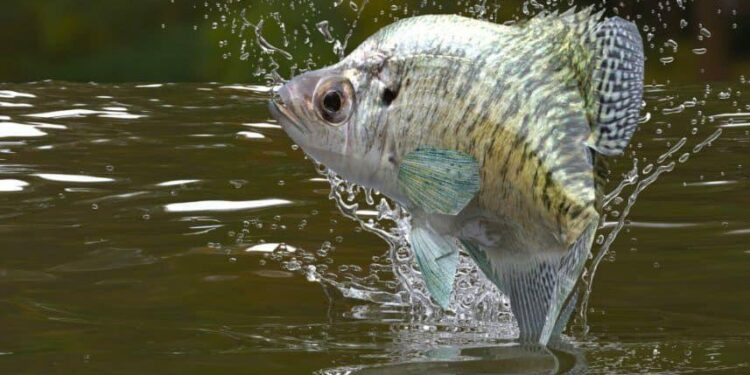You might have noticed that things are starting to green up, and with all of that green you will see some beautiful pink redbuds beginning to bloom. That usually signals the start of the spring crappie season.
According to the weekly fishing report compiled by Oklahoma Department of Wildlife Conservation, a few of lakes in the region have shown some increase in fishing action. With water temperatures nearing or entering the low 50s, crappie should start moving to the shallows to spawn, and sand bass will “run” up streams to find spawning habitat, but the cold snap and near freezing low night time temperatures will slow that down.
Crappie — Waurika, our southernmost lake, and usually the first to really “turn on” is only reporting water temps in the low 50s and crappie action is still slow. Excessive wind has lessened the water clarity, but at least water levels are approaching normal. All of that should stabilize, barring any more big cold fronts. Then we should see some pretty good fishing along the rip rap at the dam and Corum Bridge. A bonus from Waurika is the catfish fishing! Both blues and channels are being caught on the main lake.
Ellsworth and Lawtonka are reporting increasing action and warmer water temps. Both lakes are reported as below normal elevations but predicted rains next week could help lakes to fill and provide good spawning cover. As soon as the night time temperatures rebound and the water temperatures rise a little, fishing at both of these should pick up. These two lakes are usually a week behind Waurika.
Tom Steed reservoir is 6-feet low and like the water temperature, fishing has yet to heat up for crappie, but anglers are catching sandies, hybrids and saugeye on the points and rocks. Sand bass have not started their spring run yet. That run usually precedes the crappie spawn by a couple of weeks.
The best thing about the crappie spawn is that you don’t need the big fancy boat and huge tackle box — all you need to catch crappie this time of year is a rod and reel and a handful of jigs.
According to the ODWC, crappie can be found moving into shallow water to spawn once the water temperature reaches the upper 50s to lower 60s. Crappie spawning generally takes place in water only 18 to 36 inches deep.
“The best place to fish for crappie this time of year is around brush in shallow water. A small jig or minnow is often very effective and the nice thing is, you can be very successful fishing from shore.”
A technique called “doodlesocking,” which literally means fishing with a long rod tipped with a short length of line, is one of the best way to get at spawning slab crappie. Anglers once used fly rods or bamboo poles, anything with length, but now telescoping crappie rods are the mainstay.
An angler with a 10-foot crappie rod and small jig can probe and doodle in tight, shallow cover, right where crappie are spawning. A quick bob up and down will usually garner a strike, if there are fish in the location, but if a bite is not felt he will move on to the next promising spot.
Small jigs, 1/16 ounce or smaller are usually the ticket. Some like tube jigs, some prefer curly tails. Usually the best colors are white, yellow or chartreuse, but sometimes black, pumpkinseed or another color might be the best.
Catching crappie is a great opportunity to introduce a youngster to fishing. No fancy gear is required.
Sand bass – There is an old saying that says “When the oak leaves are the size of a squirrel’s ear, the sand bass are sure to bite.” Well, I don’t know if there is any truth to that saying, but I do know that if you get the chance to get out and wet a line, now is a great time to do it.
One of the traditional sand bass hot spots is Beaver creeks (big and little) above Waurika Lake. The fish are really starting to move up the creek and when they get in the holes the fishing can be tremendous.
Another hotspot for sandies is Tom Steed, and the creeks that feed that reservoir. The water level is finally high enough to allow fish to move upstream to begin the spawning process.
Lawtonka and Ellsworth also have good populations of sandies, but they usually don’t have the spawning runs like the above mentioned lakes. However, fishing the small creeks, especially after a rain, with water flowing in, can produce some nice stringers.
The nice thing about sand bass is that when they really begin to run, they are not picky on what they eat. Small rods and reels with curly tail jigs, roadrunners or other small jigs is all it takes to catch a mess of sandies. Try different colors and sizes until you find one that seems to work well.
To fish in Oklahoma, anglers 16 years and older need a resident or non-resident fishing or combination license. Other permits or requirements may apply to some lakes and anglers should always pick up a copy of the Oklahoma Fishing Guide before heading out on any fishing adventure.
While papermouths are the desired species for many this time of year, largemouth bass, white bass, catfish and many sunfish are active this time of year and will strike these baits, offering anglers a great chance to add a little variety to their stringer.
For a complete list of regulations, anglers should consult the Oklahoma Fishing Guide at wildlifedepartment.com.
Want to reach a local audience and grow your business?
Our website is the perfect platform to connect with engaged readers in your local area.
Whether you're looking for banner ads, sponsored content, or custom promotions, we can tailor a package to meet your needs.
Contact us today to learn more about advertising opportunities!
CONTACT US NOW






